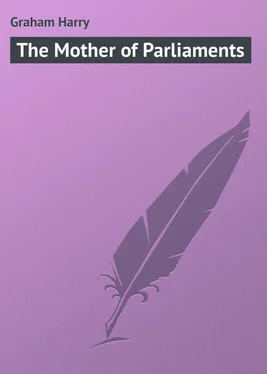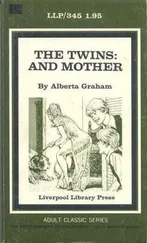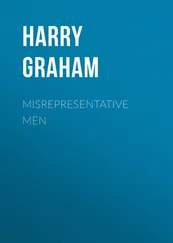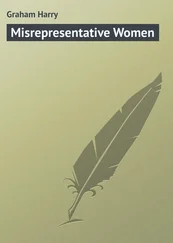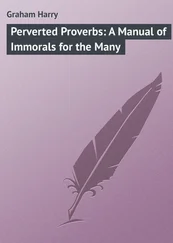Harry Graham - The Mother of Parliaments
Здесь есть возможность читать онлайн «Harry Graham - The Mother of Parliaments» — ознакомительный отрывок электронной книги совершенно бесплатно, а после прочтения отрывка купить полную версию. В некоторых случаях можно слушать аудио, скачать через торрент в формате fb2 и присутствует краткое содержание. Жанр: foreign_prose, на английском языке. Описание произведения, (предисловие) а так же отзывы посетителей доступны на портале библиотеки ЛибКат.
- Название:The Mother of Parliaments
- Автор:
- Жанр:
- Год:неизвестен
- ISBN:нет данных
- Рейтинг книги:5 / 5. Голосов: 1
-
Избранное:Добавить в избранное
- Отзывы:
-
Ваша оценка:
- 100
- 1
- 2
- 3
- 4
- 5
The Mother of Parliaments: краткое содержание, описание и аннотация
Предлагаем к чтению аннотацию, описание, краткое содержание или предисловие (зависит от того, что написал сам автор книги «The Mother of Parliaments»). Если вы не нашли необходимую информацию о книге — напишите в комментариях, мы постараемся отыскать её.
The Mother of Parliaments — читать онлайн ознакомительный отрывок
Ниже представлен текст книги, разбитый по страницам. Система сохранения места последней прочитанной страницы, позволяет с удобством читать онлайн бесплатно книгу «The Mother of Parliaments», без необходимости каждый раз заново искать на чём Вы остановились. Поставьте закладку, и сможете в любой момент перейти на страницу, на которой закончили чтение.
Интервал:
Закладка:
To-day some twenty-six spiritual peers, including the two Archbishops of Canterbury and York, are given seats in the House of Lords, where they help to swell the number of that ever-increasing assembly.
Bishops usually confine themselves exclusively in the House of Lords to the discussion of matters which concern the spiritual welfare of the nation. Their contributions to debates are generally "edifying," and when they happen to cross swords with their lay brethren they are well able to hold their own. Bishop Atterbury, of Rochester, once said of a Bill before the House that he had often prophesied that such a measure would be brought up, and was sorry to find himself a true prophet. Lord Coningsby retorted that the Right Reverend Prelate had put himself forward as a prophet, but he would only liken him to a Balaam, who was reproved by his own ass. The Bishop at once replied that he was well content to be compared to Balaam. "But, my Lords," he added, "I am at a loss to make out the other part of the parallel. I am sure that I have been reproved by nobody but his Lordship!" 39 39 Dr. King's "Anecdotes," p. 130. (It was a more modern politician who, on being reproved by an opponent, said, "Consider the case of Balaam's ass; before it spoke all men regarded it as quite an ordinary quadruped, but after it had spoken they discovered what an extraordinary ass it was!")
With the creation of new peerages by successive monarchs the list of temporal peers lengthened year by year. The Union of the three kingdoms still further added to their number. By the Acts of Union with Scotland and Ireland it was laid down that sixteen Scottish and twenty-eight Irish representative peers should sit in the House of Lords. These were to be elected by their fellow-peers, the former for each Parliament, the latter for life. 40 40 In November, 1908, the election of an Irish peer resulted in a tie between Lords Ashtown and Farnham. Such a thing had not happened since the Union. The difficulty was settled in a manner only perhaps possible in an institution as venerable as the House of Lords. In accordance with the provisions of the Act of Union, the Clerk of the Parliaments wrote the names of the candidates on two pieces of paper which he then put into a glass. One of these he drew out at random, and the peer whose name was inscribed thereon was declared to be duly elected.
They may be distinguished in other particulars as well, for though a Scottish peer can at any time resign his seat, an Irish peer can never do so. Even though he be a lunatic, or otherwise incapable of attending, he still retains his place in the legislature. He is also privileged in other ways. In 1699 the Commons resolved that no peer could give his vote at the election of a Member of Parliament, and, three years later, that he could not interfere in elections. To-day a standing order of the House of Commons imposes the same restraint upon all but Irish peers, who are exempt from these restrictions.
In 1875 the House of Lords was strengthened judicially by the introduction of four Lords of Appeal. The House, as is well known, has judicial as well as legislative functions to perform. It has always been the Supreme Court of the realm, and, ever since the reign of Queen Elizabeth, the ultimate Appeal has lain to it in all cases except those arising in Ecclesiastical Courts. Moreover, as the High Court of Parliament, in conjunction with the Commons, it is empowered to try offenders against the State whom the Commons have impeached. It also enjoys the privilege of trying any of its own members who may be charged with treason or felony, and of determining any disputed claims of peerage which may arise.
There have always been a sufficient number of Lords learned in the law to provide a court for the trial of legal cases. In the past, however, occasions have arisen when the presence of lay peers has threatened to replace the judicial aspect of the House by a political one which would be fatal to its reputation as a court of appeal. It was not, indeed, until 1845 that lords unlearned in the law began to consider their presence during the hearing of judicial causes to be not only unnecessary but undesirable, and discontinued their attendance. Thirty years later the institution of four life peerages, conferred upon eminent lawyers, added still further weight to the legal decisions of the House. The hearing of appeals is now left entirely to what are called the Law Lords, who consist of the Lord Chancellor, a number of peers who have held certain high judicial offices, and the four Lords of Appeal in Ordinary – three of whom must, by the Appellate Jurisdiction Act of 1876, be present on all appeal cases.
The granting of life peerages, conferring rights of summons to the House of Lords, save as above stated, has been adjudged to be beyond the powers of the Crown. It may truly be said that in the first days of Parliament the House of Lords consisted almost entirely of life members. But when the Government of Queen Victoria attempted to revive a practice that had lain in abeyance for some centuries they were not allowed to do so.
The Supreme Court of Appeal had been violently attacked in the Commons, where certain members declared it to be inferior to any tribunal in the land. Palmerston in 1856 determined to remedy its defects by the addition of two Law Lords who should be life peers. This scheme was upheld by the Lord Chancellor, Lord Cranworth, but met with determined opposition in the Upper House. The Law Lords were especially opposed to it, fearing that, if such a precedent were allowed, no lawyer in the future would ever be given an hereditary peerage. On the Premier's recommendation the Queen proposed to confer life peerages upon two distinguished lawyers, Parke and Pemberton Leigh, and proceeded to issue a patent to the former, creating him Baron Wensleydale for life. When, however, the matter was referred to the Committee for Privileges, they decided that no life peer could either sit or vote in the House of Lords, and the Wensleydale and Kingsdown peerages had consequently to be made hereditary.
Persons who are raised to the peerage to-day are made peers of the United Kingdom. No Scotch peer has been created since the Union in 1707, and the right of conferring an Irish peerage which existed under certain restrictions in the Act of Union has ceased to be exercised except upon one notable recent occasion. 41 41 Lord Curzon of Kedleston was so created in 1898.
During the last fifty years some one hundred and fifty additions have been made to the membership of the House of Lords. The only limit to the numerical increase of peers would seem to lie in the good sense of the Prime Minister or the patience of the Sovereign. It is of course the latter who confers peerages, though as the former usually brings suitable candidates for ennoblement to the royal notice, he is generally held responsible for the result of his recommendations. 42 42 When the last Liberal Government of Queen Victoria came into office the Court officials were discussing the new Administration one day at Windsor. "I wonder what peers they'll make," remarked one of the ladies-in-waiting. The Queen turned upon her with uplifted eyebrows. " They! " she exclaimed. An uncomfortable silence ensued. Again, in 1909, a Cabinet Minister's allusion in a speech to certain newspaper proprietors whom a Conservative Prime Minister had "taken the precaution to make into barons" inspired the King's private Secretary to write a letter to a correspondent in which he stated that, notwithstanding the Minister's statement, "the creation of Peers remains a Royal prerogative."
The House of Lords now includes some 616 members, divided, as we have seen, into four classes; the Lords Spiritual, the Lords Temporal – Princes of the Blood, Dukes, Marquesses, Earls, Viscounts, Barons – the Representative Peers of Scotland and Ireland, and the Lords of Appeal in Ordinary.
Читать дальшеИнтервал:
Закладка:
Похожие книги на «The Mother of Parliaments»
Представляем Вашему вниманию похожие книги на «The Mother of Parliaments» списком для выбора. Мы отобрали схожую по названию и смыслу литературу в надежде предоставить читателям больше вариантов отыскать новые, интересные, ещё непрочитанные произведения.
Обсуждение, отзывы о книге «The Mother of Parliaments» и просто собственные мнения читателей. Оставьте ваши комментарии, напишите, что Вы думаете о произведении, его смысле или главных героях. Укажите что конкретно понравилось, а что нет, и почему Вы так считаете.
